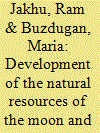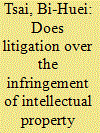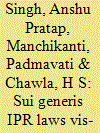|
|
|
Sort Order |
|
|
|
Items / Page
|
|
|
|
|
|
|
| Srl | Item |
| 1 |
ID:
050510


|
|
|
| 2 |
ID:
108863


|
|
|
|
|
| Publication |
2011.
|
| Summary/Abstract |
Recent media revelations have demonstrated the extent of third-party tracking and monitoring online, much of it spurred by data aggregation, profiling, and selective targeting. How to protect privacy online is a frequent question in public discourse and has reignited the interest of government actors. In the United States, notice-and-consent remains the fallback approach in online privacy policies, despite its weaknesses. This essay presents an alternative approach, rooted in the theory of contextual integrity. Proposals to improve and fortify notice-and-consent, such as clearer privacy policies and fairer information practices, will not overcome a fundamental flaw in the model, namely, its assumption that individuals can understand all facts relevant to true choice at the moment of pair-wise contracting between individuals and data gatherers. Instead, we must articulate a backdrop of context-specific substantive norms that constrain what information websites can collect, with whom they can share it, and under what conditions it can be shared. In developing this approach, the paper warns that the current bias in conceiving of the Net as a predominantly commercial enterprise seriously limits the privacy agenda.
|
|
|
|
|
|
|
|
|
|
|
|
|
|
|
|
| 3 |
ID:
085788


|
|
|
|
|
| Publication |
2008.
|
| Summary/Abstract |
The path of gradual commercialization of current space applications, such as launch services, satellite communication services, direct broadcasting services, satellite remote sensing and navigation services, and satellite weather monitoring services, will most likely be followed by future activities of use of space resources. Ventures, like mining the natural resources of the Moon and asteroids, are likely to become technologically feasible in the near future. The question is what would be the most appropriate approach to address the future needs of exploitation of space resources: should it remain the exclusive province of state governments; should the private sector take over such space activities; or should a public-private partnership type of venture be encouraged? As state governments are becoming constrained by budget deficits, an increased reliance on private sector involvement in space activities involving the extraction and use of space resources is to be expected. When deciding whether to invest in commercial ventures of resource use exploitation, any potential private investor will be faced with the issues of economic costs, risks, and perceived regulatory barriers. This study argues that the perceived regulatory barriers, i.e., the licensing requirement, the "common heritage of mankind" principle of international space law, and protection of intellectual property rights, are not obstacles to economic development. Governments should provide both policy and regulatory incentives for private sector participation in the area of space natural resource use by funding basic research and development and by sponsoring liability insurance for private ventures among other incentives.
|
|
|
|
|
|
|
|
|
|
|
|
|
|
|
|
| 4 |
ID:
101203


|
|
|
|
|
| Publication |
2010.
|
| Summary/Abstract |
This paper seeks to clarify the relationship between intellectual property right (IPR) infringement lawsuits and innovation by firms through an analysis of data from eighty-seven Taiwanese integrated circuit (IC) manufacturers in the period 2001-2006. The results show that the rapid growth in patent grant is positively related to the occurrence of patent infringement lawsuits, which implies that IPR infringement litigation strengthens firms' incentives to innovate. Patent holders adopt an "aggressive strategy" that makes use of the offensive function of patents to initiate lawsuits against alleged violators. The defendants then adopt a "regressive strategy" by building up "patent walls" to refute the charge and defend themselves. In addition, Taiwanese IC firms are more inclined to develop patents when they are defendants rather thanwhen they are plaintiffs. This suggests that the defensive function of patents has a more profound impact than the offensive function for Taiwanese IC firms. These firms do not possess the core technology needed in IC-relatedmanufacturing processes,and they have in the past applied other firms' technology without obtaining legal licenses. In response to accusations of infringement, Taiwanese IC firms adopt a "regressive strategy," encouraging their employees to develop patents which they then use to refute the charge of IPR infringement.In addition, it is found that stock-based bonuses are a better incentive for encouraging employees to develop patents for their firms.
|
|
|
|
|
|
|
|
|
|
|
|
|
|
|
|
| 5 |
ID:
085861


|
|
|
|
|
| Publication |
2008.
|
| Summary/Abstract |
The Agreement on Trade-Related Aspects at Intellectual Property Rights contains several provisions that both allow for exclusion from patentability, as well as exceptions from the exercise of the rights of the patent holder. With the exception of the first part of article 30, none of these have until now been clarified by the World Trade Organization's (WTO's) dispute-settlement system. Based on an in-depth analysis of a number of these TRIPS provisions, the article identifies whether and how human rights provisions, as well as more overall human rights principles, can be applied in order to strengthen and confer legitimacy to these exclusion and exception provisions. While there is general agreement of the weight of human rights, there is more disagreement on the relevance of human rights, primarily due to the general wording of human rights provisions. Without undertaking a full analysis of the relevant human rights provisions, the article finds that human rights also do provide guidance in negotiations and enforcement of intellectual property rights. An analysis of the prospects for taking into account human rights within the dispute-settlement system and in the political bodies of the WTO is also conducted.
|
|
|
|
|
|
|
|
|
|
|
|
|
|
|
|
| 6 |
ID:
105126


|
|
|
|
|
| Publication |
2011.
|
| Summary/Abstract |
The expansion of scope of intellectual property protection to include plant varieties and ensuing monopoly on genetic resources has raised concerns as it affects traditional rights of farmers. The International Treaty for Plant Genetic Resources for Food and Agriculture (ITPGRFA) provides an international recognition of farmers' rights. The International Union for the Protection of New Varieties of Plants (UPOV) is one of the most accepted sui generis system for the recognition of plant breeder's rights. The present study aims to analyse the farmers' rights development in South Asia from the perspective of intellectual property enforcement. Based on the membership to WTO, ITPGRFA and UPOV, the Asian countries were divided into four groups. It is observed that only Group B countries (which are members of ITPGRFA) have legislations with respect to farmers' rights. A comparison of the policy and legislation revealed that Nepal, Bangladesh, Pakistan and Philippines have framed the policy but legislations are yet awaited.
|
|
|
|
|
|
|
|
|
|
|
|
|
|
|
|
|
|
|
|
|